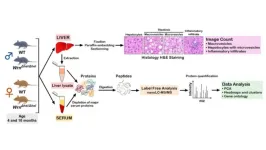(Press-News.org) Rutgers University–New Brunswick researchers conducting a study at a high-traffic intersection in a Jersey Shore town have found that the installation of a bike lane along the road approaching the convergence reduced driving speeds.
As many traffic analyses have identified speeding as a contributing factor in a majority of crashes, inducing such a “traffic calming” effect with a bike lane could enhance road safety and decrease the risk and severity of crashes, the researchers said. The research was published in The Journal of Urban Mobility.
“We are giving you more evidence that bike lanes save lives,” said Hannah Younes, a lead author of the study and a postdoctoral research associate at the Alan M. Voorhees Transportation Center in the Rutgers Bloustein School of Planning and Public Policy. “And it’s not only cyclists’ lives that could be saved. It’s more than that – drivers and pedestrians as well.”
The Rutgers team, which included experts from the Bloustein School, as well as from the Department of Civil and Environmental Engineering in the Rutgers School of Engineering and the Department of Computer Science in the Rutgers School of Arts and Sciences, focused their efforts on Cookman and Asbury Avenues in Asbury Park, N.J. Cookman, a local two-lane road, intersects with Asbury Avenue, a road that leads directly to the city’s popular Atlantic Ocean beaches.
Drivers heading to the beach often take a legal right-turn-on red at the intersection’s traffic light, gliding along the soft right turn from Cookman onto Asbury. However, Younes said, drivers frequently don’t come to a stop first, as required, but sail through, creating hazardous conditions for pedestrians and cyclists crossing at the corner.
The research team started by creating a temporary bike lane on Cookman and Asbury Avenues on the side of the road heading toward the beach, delineating it with orange road cones.
Bloustein students assisting the study then surveyed random bike and electric scooter riders using the temporary bike lane about their use of bikes and electric scooters, and their attitude toward bike lanes. Most people surveyed like bike lanes, the survey showed.
To analyze the effect of the bike lane on traffic speeds, the researchers employed computer vision techniques to classify the speed and trajectory of more than 9,000 motor vehicles. Computer vision is a subfield of AI that deals with the ability of computers to interpret and analyze visual data from the world. The researchers collected the data before creating the bike lane and after, for comparison purposes.
They found that the presence of the delineated bike lane made a difference: a 28 percent reduction in average maximum speeds and a 21 percent decrease in average speeds for vehicles turning right. For those heading straight and not turning, a smaller speed reduction of 8 percent was observed. In addition, drivers moving at a perpendicular angle to the bike lane did not slow down.
Marking the bike lanes with cones as a clearly delineated space was more effective at reducing speed than a painted-only bike lane. The painted-only bike lane was associated with a smaller speed reduction of between 11 percent and 15 percent, but only for drivers turning right.
Younes hypothesized that drivers slow down when they see a bike lane marked with the cones because the driving lane is narrower and requires more concentration, and it’s easier to notice cones or planters or some other space delineator than it is to spot painted lines on the road surface.
With pedestrian deaths rising nationally, a study such as this could contribute to the development of new traffic policies or the reversal of older ones, Younes said. Cities nationwide are adopting policies that address eliminating all fatalities and serious injuries on public roads, such as the multi-national road traffic safety project, Vision Zero, for example, she said.
A total of 7,388 pedestrian deaths occurred in 2021, representing a 13 percent increase from 2020 and 17 percent of all crash fatalities, according to the Insurance Institute for Highway Safety.
Other researchers on the study were: Clinton Andrews, a professor, Robert Noland, a distinguished professor, Wenwen Zhang, an associate professor and Leigh Ann Von Hagen, a managing director and adjunct professor, all from the Bloustein School; Jie Gong, an associate professor, and Jiahao Xia, a graduate assistant, from the Department of Civil and Environmental Engineering in the School of Engineering; Dimitris Metaxas, a distinguished professor, and Song Wen, a graduate assistant, in the Department of Computer Science in the School of Arts and Sciences.
END
Traffic speeds decrease when bike lane is present
Rutgers researchers make finding after looking for ways to lower the incidence of vehicle crashes
2024-06-03
ELSE PRESS RELEASES FROM THIS DATE:
Proteomics uncover sexual dimorphism and immune changes in aging mice with Werner syndrome
2024-06-03
“Proteomics analysis at different ages allows us to follow the progressive biological alterations (including histological fat accumulation) in the liver according to age and/or the Wrn genotype.”
BUFFALO, NY- June 3, 2024 – A new research paper was published on the cover of Aging (listed by MEDLINE/PubMed as "Aging (Albany NY)" and "Aging-US" by Web of Science) Volume 16, Issue 10, entitled, “Integrated liver and serum proteomics uncover sexual dimorphism and alteration of several immune response proteins in an aging Werner syndrome mouse model.”
Werner syndrome (WS) is a ...
A technique for more effective multipurpose robots
2024-06-03
CAMBRIDGE, MA – Let’s say you want to train a robot so it understands how to use tools and can then quickly learn to make repairs around your house with a hammer, wrench, and screwdriver. To do that, you would need an enormous amount of data demonstrating tool use.
Existing robotic datasets vary widely in modality — some include color images while others are composed of tactile imprints, for instance. Data could also be collected in different domains, like simulation or human demos. And each dataset ...
Oral nucleoside antiviral is progressing toward future pandemic preparedness
2024-06-03
May 23, 2024
Obeldesivir (GS-5245), a novel investigational small molecule oral antiviral, represents a new tool in the ongoing effort to prepare for future pandemics.
Several researchers at the University of North Carolina at Chapel Hill’s Gillings School of Global Public Health are co-authors of a new study published online May 22 by the journal Science Translational Medicine.
The study shares findings from an academic-corporate partnership between biopharmaceutical company Gilead Sciences and the Sheahan ...
Shape and depth of ocean floor profoundly influence how carbon is stored there
2024-06-03
Key takeaways
The movement of carbon between the atmosphere, oceans and continents — or carbon cycle — regulates Earth’s climate, with the ocean playing a major role in carbon sequestration.
A new study finds that the shape and depth of the ocean floor explain up to 50% of the changes in depth at which carbon has been sequestered there over the past 80 million years.
While these changes have been previously attributed to other causes, the new finding could inform ongoing efforts to combat climate change through marine carbon sequestration.
The movement of carbon between the atmosphere, oceans and continents — the carbon ...
Airplane noise exposure may increase risk of chronic disease
2024-06-03
FOR IMMEDIATE RELEASE
Monday, June 3, 2024
Contact:
Jillian McKoy, jpmckoy@bu.edu
Michael Saunders, msaunder@bu.edu
##
Airplane Noise Exposure May Increase Risk of Chronic Disease
A new study found that people who were exposed to higher levels of noise from aircraft were more likely to have a higher body mass index, an indicator for obesity that can lead to stroke or hypertension. The findings highlight how the environment—and environmental injustices—can shape health outcomes.
Research has shown that noise from airplanes and helicopters flying overhead are far more bothersome to people than noise from other modes of transportation, ...
Mental health, lack of workplace support are leading factors driving nurses from jobs
2024-06-03
Coworker and employer support are strong predictors of nurses planning to stay in their jobs, while symptoms of depression are linked to nurses planning to leave, according to a study conducted at the height of the COVID-19 pandemic by researchers at NYU Rory Meyers College of Nursing.
The research—published in the Online Journal of Issues in Nursing, a journal of the American Nurses Association—examines both pandemic-related factors and the overall work environment for nurses and can help organizational ...
U.S. health departments experience workforce shortages and struggle to reach adequate staffing levels in public health
2024-06-03
Gaps persist in hiring enough U.S. public health workers and health departments continue to face challenges in recruiting new employees, according to a new study by Columbia University Mailman School of Public Health and Indiana University. Insufficient funding, a shortage of people with public health training, and a lack of visibility for public careers, in addition to lengthy hiring processes, are cited as barriers contributing to an absence of progress for achieving a satisfactory level of workers. The results ...
Redox Science Meets Medicine at the 26th International Conference on Redox Medicine 2024 this June in Paris
2024-06-03
Redox Science Meets Medicine at the 26th International Conference on Redox Medicine 2024 this June in Paris
The 26th International Conference on Redox Medicine 2024 will take place this month, on June 27-28 at Fondation Biermans-Lapôtre in Paris, France.
With 41+ communications and participants from 20 different countries, the conference promises a diverse exchange of knowledge and ideas.
The sessions of the conference are organized around key topics, with each speaker addressing a specific ...
Albert Einstein College of Medicine names Marla Keller, MD, Executive Dean
2024-06-03
June 3, 2024—(BRONX, NY)—Marla Keller, M.D., a national leader in academic medicine and in clinical and translational research and training, has been appointed executive dean at Albert Einstein College of Medicine. In this role, Dr. Keller will work closely with Yaron Tomer, M.D., the Marilyn and Stanley M. Katz Dean at Einstein, other executive leaders at the College of Medicine and Montefiore, and the Board of Trustees to achieve the vision for the institution. As Einstein’s second most senior officer, she will drive strategic planning for the College of Medicine and provide guidance across all academic and research programs.
Dr. ...
Two-pronged attack strategy boosts immunotherapy in preclinical studies
2024-06-03
JUNE 3, 2024, NEW YORK – A novel immunotherapy approach developed by Ludwig Cancer Research scientists employs a two-pronged attack against solid tumors to boost the immune system’s ability to target and eliminate cancer cells.
The research focuses on an immunotherapy called adoptive cell transfer (ACT), which involves extracting T cells from a patient, enhancing their ability to fight cancer, expanding them in culture and reinfusing them into the patient’s body.
“While T cell therapies have shown tremendous ...
LAST 30 PRESS RELEASES:
A “smart fluid” you can reconfigure with temperature
New research suggests myopia is driven by how we use our eyes indoors
Scientists develop first-of-its-kind antibody to block Epstein Barr virus
With the right prompts, AI chatbots analyze big data accurately
Leisure-time physical activity and cancer mortality among cancer survivors
Chronic kidney disease severity and risk of cognitive impairment
Research highlights from the first Multidisciplinary Radiopharmaceutical Therapy Symposium
New guidelines from NCCN detail fundamental differences in cancer in children compared to adults
Four NYU faculty win Sloan Foundation research fellowships
Personal perception of body movement changes when using robotic prosthetics
Study shows brain responses to wildlife images can forecast online engagement — and could help conservation messaging
Extreme heat and drought at flowering could put future wheat harvests at risk
Harlequin ichthyosis: a comprehensive review of pathogenesis, diagnosis, and management
Smithsonian planetary scientists discover recent tectonic activity on the Moon
Government censorship of Chinese chatbots
Incorporating a robotic leg into one’s body image
Brain imaging reveals how wildlife photos open donor wallets
Wiley to expand Advanced Portfolio
Invisible battery parts finally seen with pioneering technique
Tropical forests generate rainfall worth billions, study finds
A yeast enzyme helps human cells overcome mitochondrial defects
Bacteria frozen in ancient underground ice cave found to be resistant against 10 modern antibiotics
Rhododendron-derived drugs now made by bacteria
Admissions for child maltreatment decreased during first phase of COVID-19 pandemic, but ICU admissions increased later
Power in motion: transforming energy harvesting with gyroscopes
Ketamine high NOT related to treatment success for people with alcohol problems, study finds
1 in 6 Medicare beneficiaries depend on telehealth for key medical care
Maps can encourage home radon testing in the right settings
Exploring the link between hearing loss and cognitive decline
Machine learning tool can predict serious transplant complications months earlier
[Press-News.org] Traffic speeds decrease when bike lane is presentRutgers researchers make finding after looking for ways to lower the incidence of vehicle crashes




